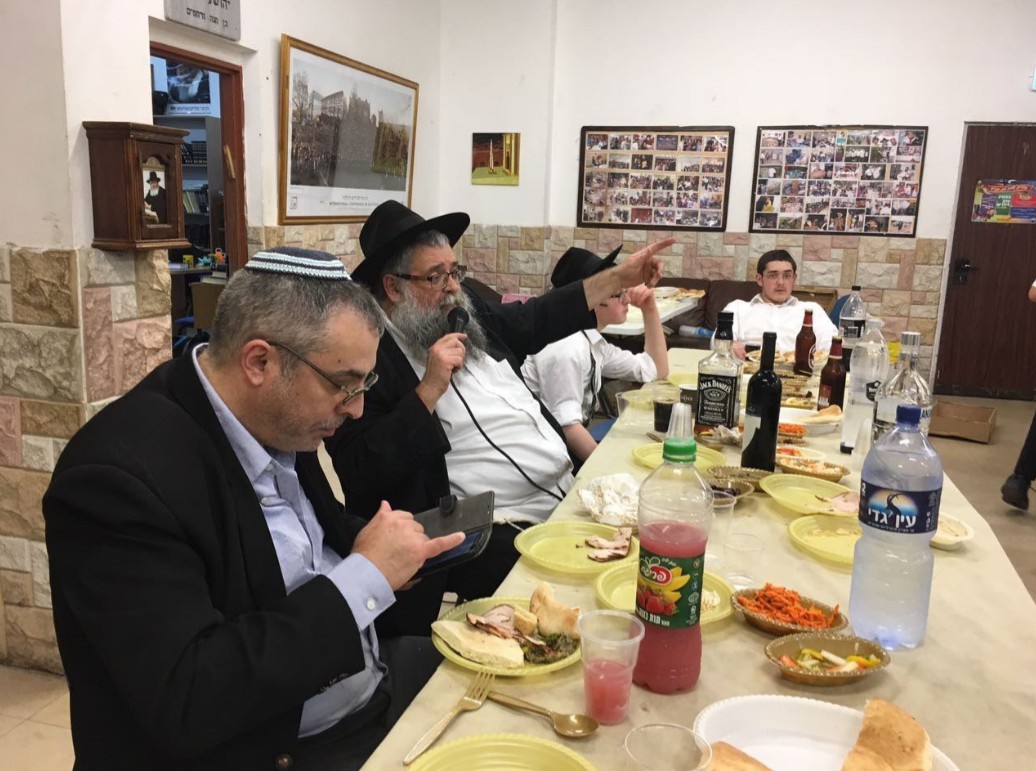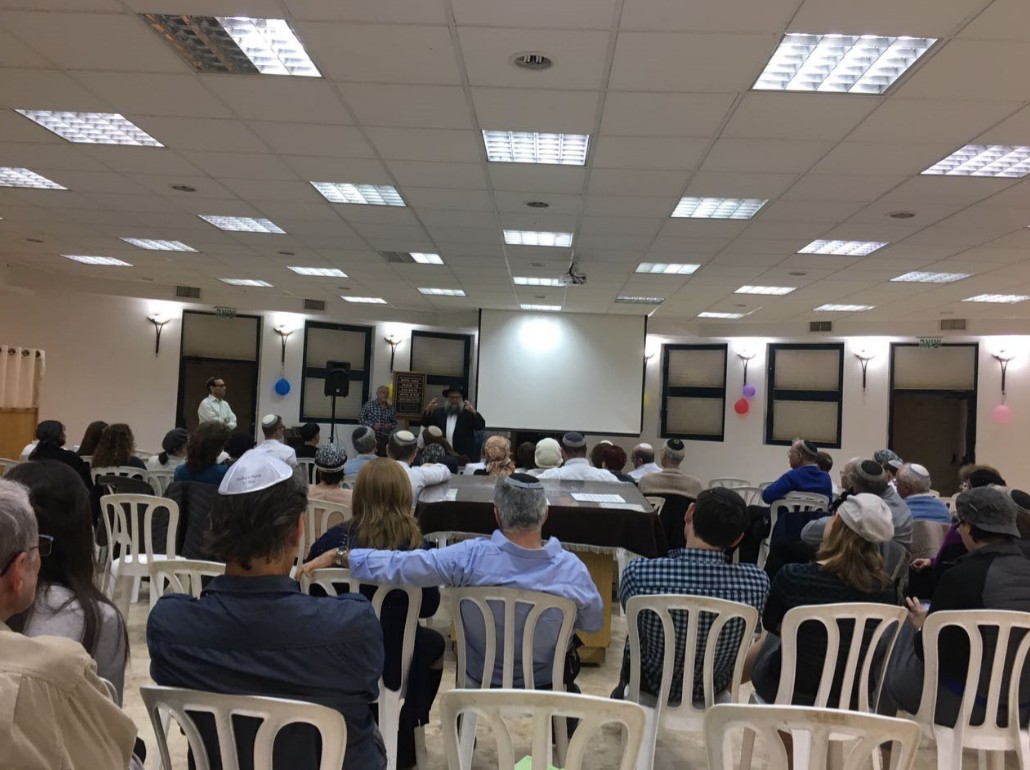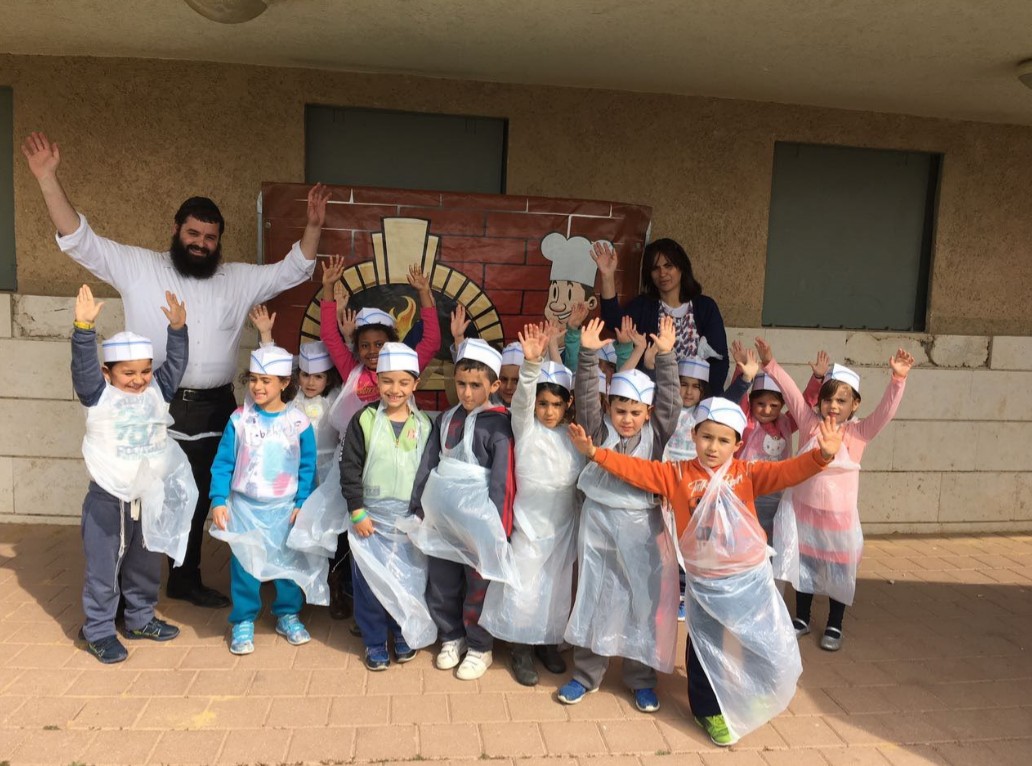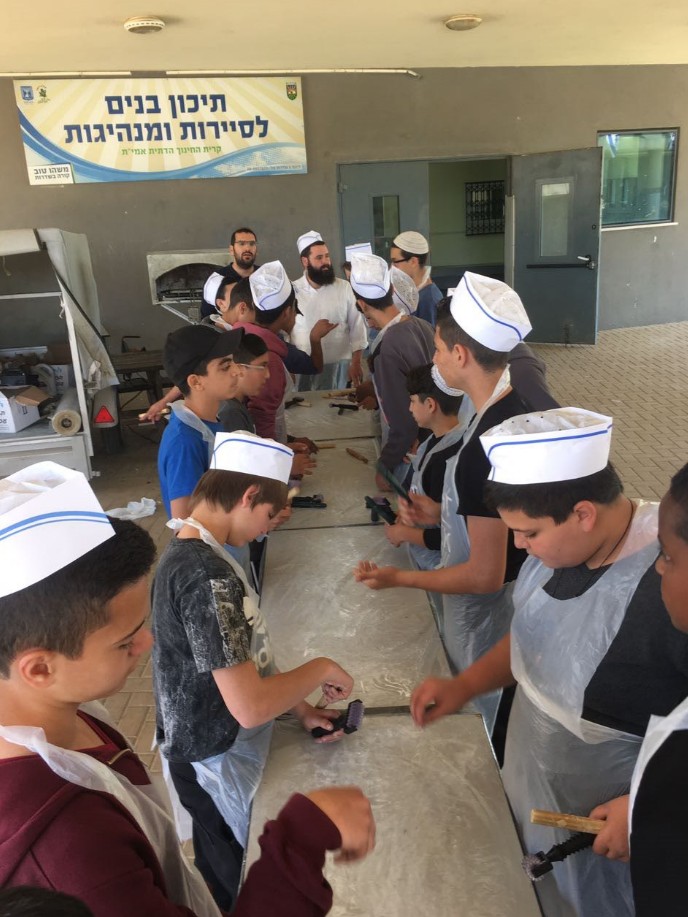When the Qassams Started Falling in Sderot, We Understood Why the Rebbe Sent Us Here
In a special holiday interview, Rabbi Ze'ev Pizem, Chabad emissary in Sderot, shares for the first time about the precise instructions he received directly from the Rebbe for his mission, about the Passover Seder reminiscent of the Temple, and about the massive operation to fly hundreds of children to summer camps abroad.
 Rabbi Ze'ev Pizem on the right
Rabbi Ze'ev Pizem on the right"After thankfully receiving a positive response from the Rebbe of Lubavitch regarding our request to serve as his emissaries in Sderot", says Rabbi Ze'ev Pizem, Chabad emissary in the cultural capital of the Negev, with the enthusiasm that Chabadniks reserve for when they speak of their Rebbe, "the first thing we did was look for an apartment in the city center. Back then, this wasn't an easy task. There was no Facebook, not even real estate agents, so my wife and I walked from place to place to find a roof over our heads to start our activities."
"It's hard to believe today, but that was indeed the reality - we knocked on doors, passed between neighbors, asking if anyone knew of a vacant apartment. Most directed us to a small, closed-off neighborhood at the edge of town inhabited by ultra-Orthodox residents. I can't blame them. We looked like ultra-Orthodox in every aspect. Nevertheless, we explained to everyone that we actually wanted to live in the city center. With the grace of Hashem, we happily found an apartment in a big block with the common people of Israel. Today, many returning Jews, married with children, live in and around Sderot, thanks to us living in that old block."
It's not easy to catch Rabbi Ze'ev Pizem (54), husband to Sima and father of 9, for a conversation these days, on the eve of Passover. Besides organizing the massive central Seder at Chabad House in Sderot for the 30th consecutive year - marking three decades of their activity in the city, a Seder that attracts crowds without anyone to celebrate with - the Rabbi and his family are busy gathering donations for food distribution to the needy, running matzah baking workshops in schools and kindergartens, giving Torah lessons, and more. Despite all this, we talked to the Rabbi to hear about their extensive work over the years, and of course, began with the early years.

"In general, it must be understood that the entire emissary operation established by the Rebbe was done in stages. In the early years, the Rebbe simply called on people and told each one where they should go. People received instructions – you to Australia, you to France, and so forth. After a certain period, this practice ceased, and things were managed differently. People who saw themselves as fit to be the Rebbe's emissaries offered themselves up, and also suggested the place they thought suitable. Then they would wait for the Rebbe's response. Some received approval, and some did not."
How did it happen for you? And why Sderot specifically?
"I grew up in the Kiryat. As strange as it sounds, I didn't even know there was a place called Sderot. However, my father-in-law, Rabbi Abraham Dunin, although he lived in the Jezreel Valley, served on a mission in Moshav Brosh in the south for several years. When he would pick up children from the area, he got to know Sderot. Practically, he was the one who suggested my wife, his daughter, and me to embark on a mission in Sderot. Following this, we asked the Rebbe for his consent and blessing, and we received it, along with certain guidelines related to the place and the people living there. This included names of people and places. It was very powerful. So we came here, even though we didn't know a soul. Absolutely no one."
What were your initial steps in the city?
Shortly after we arrived, we began organizing activities for children and reciting verses, as is customary in Chabad. With Hashem's blessing, many people today observe the Torah and commandments because of those recitations. It's truly incredible what a simple activity can accomplish. How much impact it has on the soul. Simultaneously, we began offering Torah lessons, held memorials for righteous individuals, and that's how it developed. The people in Sderot are very warm and friendly, and they mostly received us with warmth and love.

Mission Under Fire
As known, the sages said "a decree on the dead is that they be forgotten from the heart," and indeed most of the public in Israel no longer remembers the wounded and killed by the Qassam rockets in Sderot, and the toughest years the city underwent, but there are those who remember well. Among them is Rabbi Pizem, who not only had to navigate those years with his family but also, and perhaps especially, assist the other residents of the city. "First of all, it must be said that this period is after the 2000s. From the perspective of Sderot's residents, it's a whole different era. Before all this started, it was very quiet in Sderot, really nice. For us, until then, we helped people with spiritual matters and also material things, but quite routinely. And then, out of nowhere, rockets started flying. It completely altered the fabric of life.
"I think most people in Israel barely knew about Sderot before any of this, or didn't know at all, and as a result, initially, people here were pretty excited about the new status, because suddenly they wrote about us in newspapers, talked about us on the news. Newspapers here would sell out in five minutes. But very quickly, joy turned into sadness and fear. Many people in the city still have severe trauma. Elderly, women, children."
When all this happened, how did you feel about the Rebbe sending you to such a fearful city?
"I think we quickly understood why the Rebbe sent us here. We understood that now we weren't just dealing with Judaism in the ordinary sense. We felt our activities in the city also instilled confidence in people. Strengthened their spirit. Their resilience. It was clear to us we wouldn't leave. The challenging situation of the city compelled us to stay. We constantly thought about how to improve residents' lives. Among other things, we held summer camps for children outside the city - for them to unwind, but most of the activities were inside the Chabad House, as it was relatively fortified. We set up a large gymboree club where children came to play. It was a bizarre period. Outside, the red alert sounded, rockets were falling, and inside the Chabad House, children played peacefully."

This situation lasted for several years. How did you cope with it?
"Yes, it really wasn't easy, and over time, the situation worsened. Many children in the city were feeling really bad emotionally. There were long periods when 50-60 rockets fell here every day. It was simply abnormal. Truly terrifying and dreadful. And unfortunately, there were many victims and fatalities. In this regard, one of the biggest operations we conducted was in collaboration with many Chabad houses abroad. Thank Hashem, we flew 200 children, who were in real psychological danger, to overseas camps, to Chabad summer camps. Many people rallied for this cause, and the children were overjoyed. They were encouraged there, fortified, and truly healed."
However, according to Rabbi Pizem, it wasn't just the children who suffered greatly. "The elderly were also in the frontline of those who experienced severe disruption to their lifestyles. There were elderly who found it difficult to reach various places, and they were also terribly afraid, and we helped them in this matter. Simultaneously, we also provided financial assistance to people who fell through the cracks - between the time a rocket destroyed their home, until the state paid them what they were owed due to it - they wanted to rebuild their homes. A mission under fire is something not many people get to experience. It's highly unique in the world. But apparently Hashem thought we were suited for it. I know why the Rebbe sent us here. Everything that happens is under the private supervision of Hashem. There are no mistakes. Each of us, in every place, in every country, wherever we arrive - has a mission."

Passover is just around the corner, what are your preparations for the holiday?
"When Passover approaches, there are several matters. But the highlight is the "Kimcha D'Pischa" that we collect. Hundreds of families receive food baskets from us, among them Torah scholars with many children, and every Jew who needs - receives assistance from us, as far as we are able, of course. These are truly people who, without this help, would barely have what to eat during the holiday. Sadly, it's very difficult for us to obtain the funds annually. Many times we also happen not to raise enough money, and not infrequently people asked us for help - and there was nothing to give.
"Besides that, we also organize a public Seder. It's a well-known instruction from the Rebbe, because as is known, there are lonely people, solitary people, or simply people who don't know how to conduct the Seder. And it's a great joy when you do it together, such a Seder. Most people don't know this, but it's a very strong experience. By the way, that's how it was in the Temple - Passover was a holiday with a bustling atmosphere, many people, everyone ascended to Jerusalem. It was very populous. So it’s true, today there isn’t a Temple – but it’s important to maintain the atmosphere. My children, may they be healthy, some of them married with children, have never seen an ordinary Seder. A regular Seder that's celebrated only with the family, at home. Since we arrived in Sderot – we've only done public Seders. They know only what Passover looks like, as it was, and as it will be, with Hashem’s help, very soon, in the Temple."

